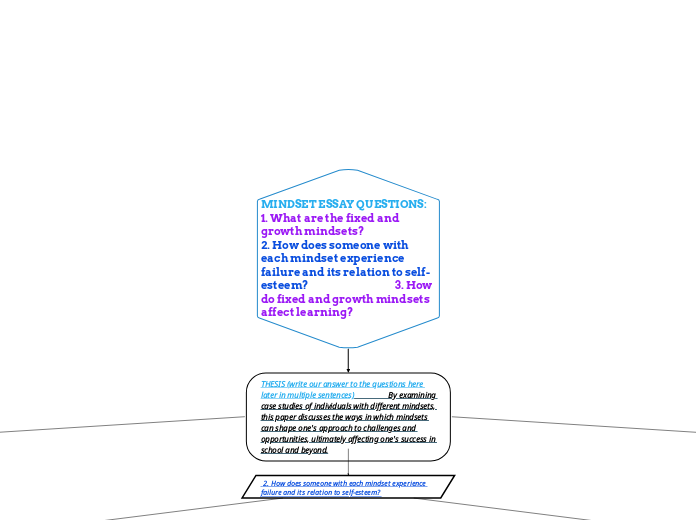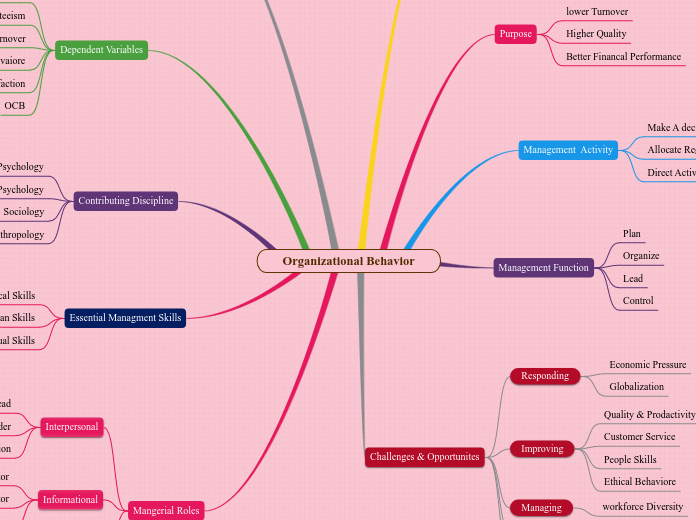MINDSET ESSAY QUESTIONS: 1. What are the fixed and growth mindsets? 2. How does someone with each mindset experience failure and its relation to self-esteem? 3. How do fixed and growth mindsets affect learning?
THESIS (write our answer to the questions here later in multiple sentences) By examining case studies of individuals with different mindsets, this paper discusses the ways in which mindsets can shape one's approach to challenges and opportunities, ultimately affecting one's success in school and beyond.
3. How do fixed and growth mindsets affect learning?
How does the growth mindset affect learning?
MP: (write main point here) The mindset we adopt greatly affects our approach to learning and has a significant impact on our educational journey. A growth mindset plays a vital role in enhancing learning outcomes by fostering a love for learning, promoting resilience, and nurturing a willingness to embrace challenges.
Having this mindset benefits one greatly for they believe they can and will achieve something not only that they have a good approach to learning new material something the other side lacks and this is what makes the growth mindset better then the fixed mindset.
Example 3: "People with the growth mindset know that it takes time for potential to flower." (Dweck 28).
Example 2: "People in a growth mindset don't just seek challenge, they thrive on it. The bigger the challenge, the more they stretch. And nowhere can it be seen more clearly than in the world of sports. You an just watch people stretch and grow." (Dweck 21).
Example 1: "One seventh-grade girl summed it up. "I think intelligence is something you have to work for . . . it isn't just given to you. . . . Most kids, if they're not sure of an answer, will not raise their hand to answer the question. But what I usually do is raise my hand, because if I'm wrong, then my mistake will be corrected. Or I will raise my hand and say, 'How would this be solved?', or 'I don't get this. Can you help me?' Just by doing that I'm increasing my intelligence."" (Dweck 17).
How does the fixed mindset affect learning?
MP: (write main point here) A fixed mindset can significantly limit one's learning because the individual believes that their abilities are predetermined and they lack drive and motivation to improve and learn.
Having this certain mindset damages oneself due to the fact they believe if they can't do something at first then they will never be able to do it and that significantly hurts the person.
Example 3: "For in the fixed mindset it's not enough just to succeed. It's not enough just to look smart and talented. You have to be pretty much flawless. And you have to be flawless right away." (Dweck 24).
Example 2: "When do people with the fixed mindset thrive? When things are safely within their grasp. If things get too challenging-- when they're not feeling smart or talented-- they lose interest." (Dweck 22).
Example 1: "But those with the fixed mindset didn't want to expose their deficiencies. Instead, to feel smart in the short run, they were willing to put their college careers at risk. This is how the fixed mindset makes people into nonlearners." (Dweck 18).
2. How does someone with each mindset experience failure and its relation to self-esteem?
How does someone with a growth mindset experience failure and its relation to self-esteem?
MP: (write main point here) When someone with a growth mindset experiences failure they tend to use the experience as a learning curve and get discouraged slightly but then know that they can build off of it and their self-esteem stays high and keep the same mentality that they can do it.
Having a growth mindset boost ones self esteems because they know that if they can't do something the first try they will continue to try until they finally get what they have been practicing for.
Example 3: "Children with the growth mindset, on the other hand, couldn't tear themselves away from the hard problems. These were their favorites and these were the ones they wanted to take home. "Could you write down the name of these puzzles," one child asked, "so my mom can buy me some more when these ones run out?"" (Dweck 23).
Example 2: "In contrast, students with the growth mindset continued to show the same high level if interest even when they found the work very challenging. "It's a lot more difficult for me than I thought it would be, but it's what I want to do, so that only makes me more determined. When they tell me I can't, it really gets me going."" (Dweck 23).
Example 1: "When I gave people with the growth mindset the same vignette here's what they said. They'd think: "I need to try harder in class, be more careful when parking the car, and wonder if my friend had a bad day." "The C+ would tell me that I'd have to work a lot harder in the class, but I have the rest of the semester to pull up my grade." (Dweck 9).
How does someone with a fixed mindset experience failure and its relation to self-esteem?
MP: (write main point here) When someone with a fixed mindset experiences failure they tend to get down on themselves and doubt themselves and their view of themselves becomes distorted.
People that possess the fixed mindset are challenged and then crash immediately feel they are not worthless and feel they are incapable of that task and then soon after feel they are not smart
Examples 3: "We saw the same thing in younger students. We gave fifth graders intriguing puzzles, which they all loved. But when we made them harder, children with the fixed mindset showed a big plunge in enjoyment. They also changed their mind about taking some home to practice. (Dweck 26).
Example 2: "One day, you go to a class that is really important to you and that you like a lot. The professor returns the midterm papers to the class. You got a C+. You're very disappointed. That evening on the way back to your home, you find that you've gotten a parking ticket. Being really frustrated, you call your best friend to share your experience but are sort of brushed off.... When I asked people with the fixed mindset, this is what they said: "I'd feel like a reject." "I'm a total failure." "I'm an idiot." "I'm a loser." "I'd feel worthless and dumb-- everyone's better than me." (Dweck 8).
Example 1: "Again, failures labeled them and left them no route to success. And the more depressed they felt, the more they let things go, the less they took action to solve their problems. For example, they didn't study what they needed to, they didn't hand in their assignments on time, and they didn't keep up with their chores." (Dweck 38)
1. What are the fixed and growth mindsets?
What is the growth mindset?
MP: (write main point here) In a growth mindset people believe that their most basic abilities can be developed through dedication and hard work—brains and talent are just the starting point.
Individuals that have obtained the growth mindset believe in modifying and heightening their intelligence through commitment.
Example 3: ""There is no such thing as a natural-born pilot. Whatever my aptitude or talents, becoming a proficient pilot was hard work, really a lifetime's learning experience. . . . The best pilots fly more than others; that's why they're the best." Like Michael Jordan, he was a human being. He just stretched himself farther than most." (Dweck 32).
Example 2: "Patricia Miranda was a chubby, unathletic high school kid who wanted to wrestle. After a bad beating on the mat, she was told, "you're a joke." First she cried, then she felt: "That really set my resolve . . . I had to keep going and had to know if effort and focus and belief and training could somehow legitimize me as a wrestler."" (Dweck 21).
Example 1: "Everyone is born with an intense drive to learn. Infants stretch their skills daily. Not just ordinary skills, but the most difficult tasks of a lifetime, like learning to walk and talk. They never decide it's too hard or not worth the effort. Babies don't worry about making mistakes or humiliating themselves. They walk, they fall, they get up. They just barge forward." (Dweck 16).
What is the fixed mindset?
MP: (write main point here) A fixed mindset is a way of thinking that believes intelligence, talents and personalities are permanent and cannot change.
ELABORATION ON MAIN POINT
Individuals with the fixed mindset believe that they are born with a certain limit of intelligence and talent and that it is eternal and changeless.
(EXAMPLES FROM THE BOOK)
Example 3: "Believing that your qualities are carved in stone--- the fixed mindset--- creates an urgency to prove yourself over and over. If you only have a certain amount of intelligence, a certain personality, and a certain moral character...." (Dweck 6).
Example 2: "Why is effort so terrifying? There are two reasons. One is that in the fixed mindset, great geniuses are not supposed to need it. So just needing it casts a shadow on your ability." (Dweck 43)
Example 1: "Fixed mindset created the feeling of utter failure and paralysis" (Dweck 9).









